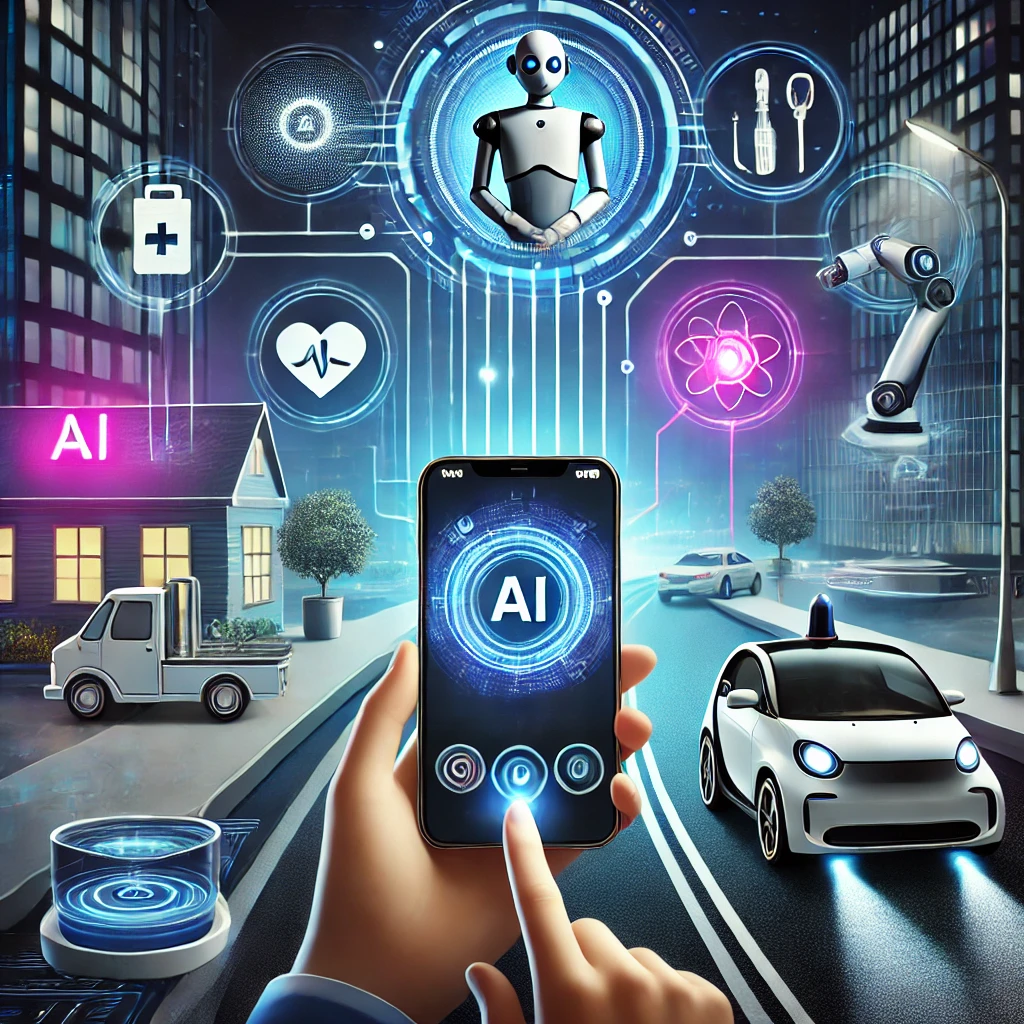Artificial Intelligence (AI) has transitioned from science fiction to everyday reality, transforming the way we interact with technology. Over the last decade, AI has made significant strides, finding its way into devices, applications, and services that we use daily. From smartphones to virtual assistants and even healthcare systems, AI has become an integral part of modern technology. In this article, we will explore how AI is shaping everyday tech and the potential it holds for the future.
AI in Smartphones
Smartphones are perhaps the most accessible example of AI in everyday life. Whether you’re using facial recognition to unlock your phone or receiving personalized app recommendations, AI is working behind the scenes to make your experience smoother. Features such as voice assistants, predictive text, and camera optimization rely heavily on AI algorithms.
- Voice Assistants: AI-driven voice assistants like Siri, Google Assistant, and Alexa have become commonplace, allowing users to interact with their devices using natural language. These assistants use machine learning to improve their responses over time, making them more efficient and personalized.
- Camera Optimization: Many smartphone cameras now use AI to enhance photos automatically. AI analyzes the scene and adjusts settings like exposure, brightness, and focus to deliver the best shot, even in challenging lighting conditions.
- App Personalization: AI helps apps learn from your behavior. Whether it’s recommending music on Spotify, showing relevant videos on YouTube, or predicting your next move on a fitness app, AI is the driving force behind personalized experiences.
AI in Virtual Assistants and Smart Homes
The concept of a smart home, once limited to futuristic movies, is now a reality, thanks to AI. Virtual assistants such as Amazon Alexa, Google Home, and Apple’s HomeKit use AI to control various aspects of your home environment. From controlling lights to setting reminders and playing your favorite playlist, AI simplifies tasks and improves convenience.
- Smart Appliances: AI-powered appliances, such as smart thermostats (e.g., Nest), smart fridges, and robotic vacuum cleaners (e.g., Roomba), learn from user behavior to optimize energy use and functionality. These devices can adjust settings automatically, ensuring efficiency and user comfort.
- Home Security: AI is also making homes safer. AI-driven security systems can detect unusual activity through facial recognition, notify homeowners of potential threats, and even differentiate between regular visitors and strangers.
AI in Healthcare
AI is making substantial contributions to healthcare, revolutionizing how diagnoses and treatments are carried out. AI-powered systems can analyze medical data, such as images and patient histories, to assist doctors in diagnosing conditions more accurately and efficiently.
- Medical Imaging: AI algorithms are used to analyze medical images like X-rays, CT scans, and MRIs. By identifying patterns in the images, AI can help detect diseases such as cancer at an early stage, often more accurately than human doctors.
- Personalized Medicine: AI is also making strides in personalized medicine by analyzing patient data to recommend tailored treatments based on individual genetic profiles. This approach is paving the way for more effective treatments, especially in areas like oncology.
- Virtual Health Assistants: AI chatbots and virtual health assistants are becoming common tools to help patients manage chronic conditions, schedule appointments, and even provide mental health support. These virtual assistants use natural language processing (NLP) to communicate with patients and offer personalized advice.
AI in Transportation: Autonomous Vehicles
AI is the cornerstone of autonomous vehicle development. Self-driving cars use machine learning algorithms to process massive amounts of data from sensors, cameras, and maps, enabling the vehicle to make real-time decisions on navigation, speed, and obstacle avoidance.
- Autonomous Cars: Companies like Tesla, Waymo, and Uber are investing heavily in AI to develop fully autonomous cars that can navigate roads without human intervention. These vehicles use AI to interpret their surroundings, recognize traffic signs, and adjust to changing road conditions.
- Smart Traffic Management: AI also contributes to smart traffic management systems, which help reduce congestion and optimize traffic flow in cities. By analyzing traffic patterns and predicting demand, AI can recommend alternative routes and improve overall traffic efficiency.
Challenges and Ethical Considerations
While AI offers immense potential, it also comes with challenges. Ethical concerns around privacy, bias, and job displacement are hot topics in AI development. For example:
- Privacy: AI systems often rely on large datasets, which raises questions about data privacy and how personal information is used and stored.
- Bias in AI: AI algorithms can sometimes reflect biases present in their training data, leading to unfair or discriminatory outcomes in areas like hiring, lending, or law enforcement.
- Job Automation: The rise of AI-driven automation in various industries could lead to job displacement for workers in certain sectors, particularly in roles that involve repetitive tasks.
The Future of AI in Everyday Life
As AI continues to evolve, it will likely become even more embedded in everyday technology. We can expect smarter devices, more personalized services, and greater efficiency in various sectors. However, addressing the ethical challenges that come with AI development will be crucial to ensuring that this technology benefits everyone.
In conclusion, AI is no longer a futuristic concept—it’s part of our daily lives, powering everything from smartphones to healthcare systems. As technology advances, AI will continue to play a pivotal role in shaping the way we live and interact with the world around us. The challenge will be to harness its power responsibly, ensuring that it is used ethically and for the benefit of all.
